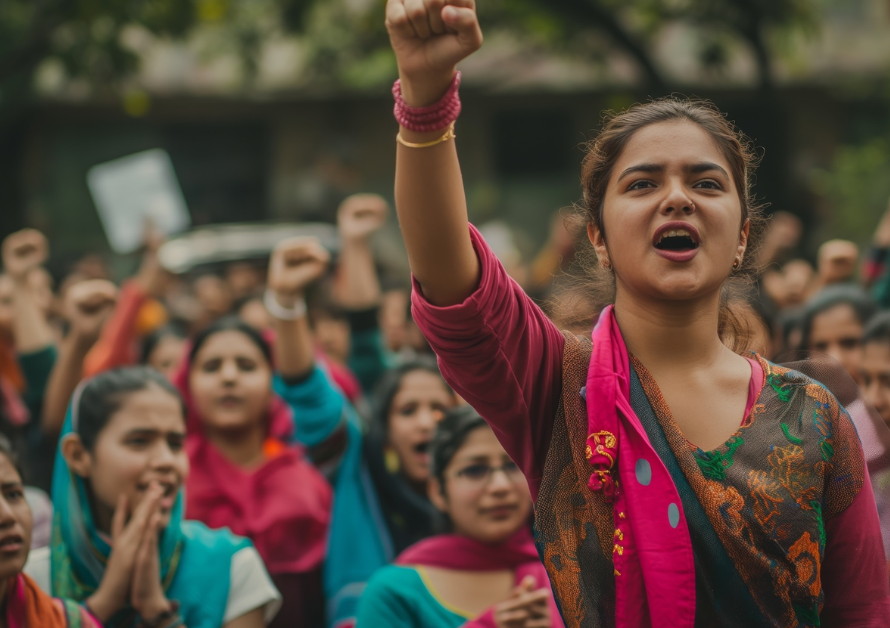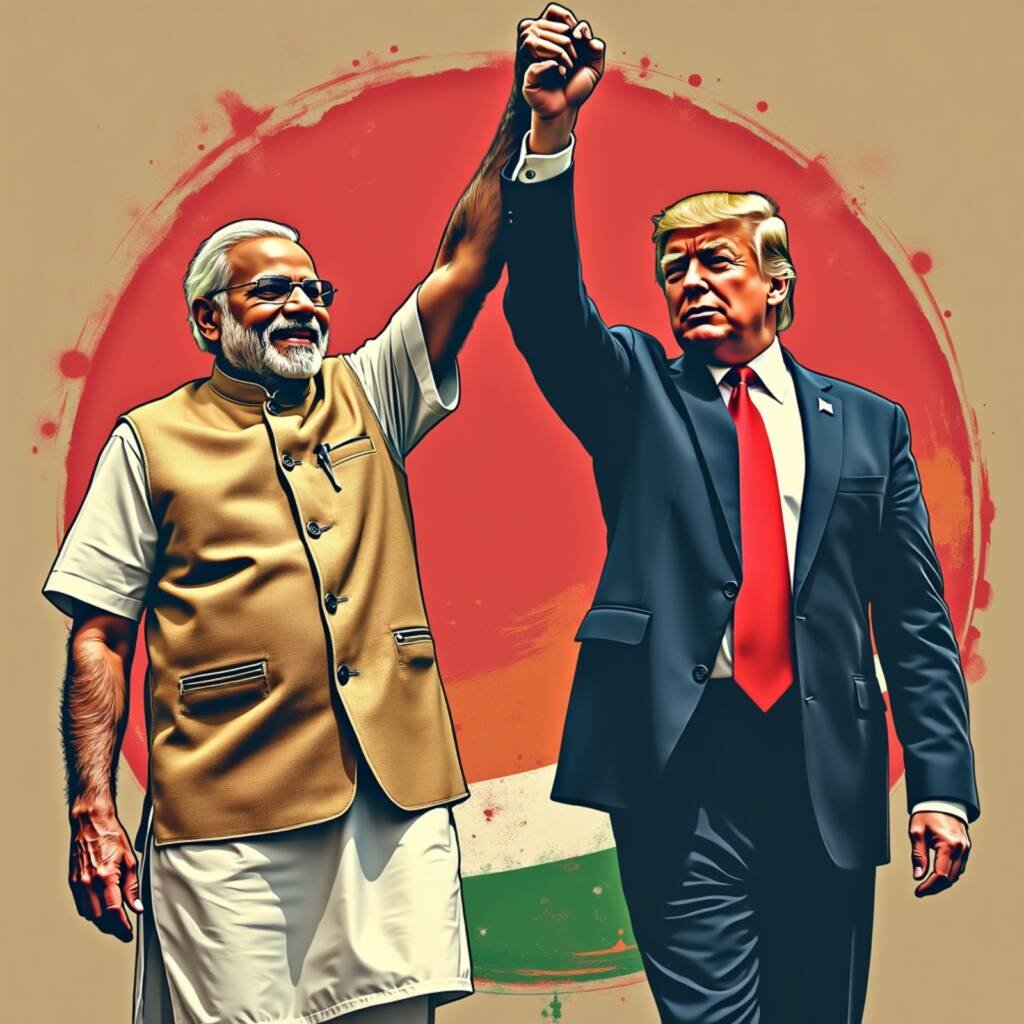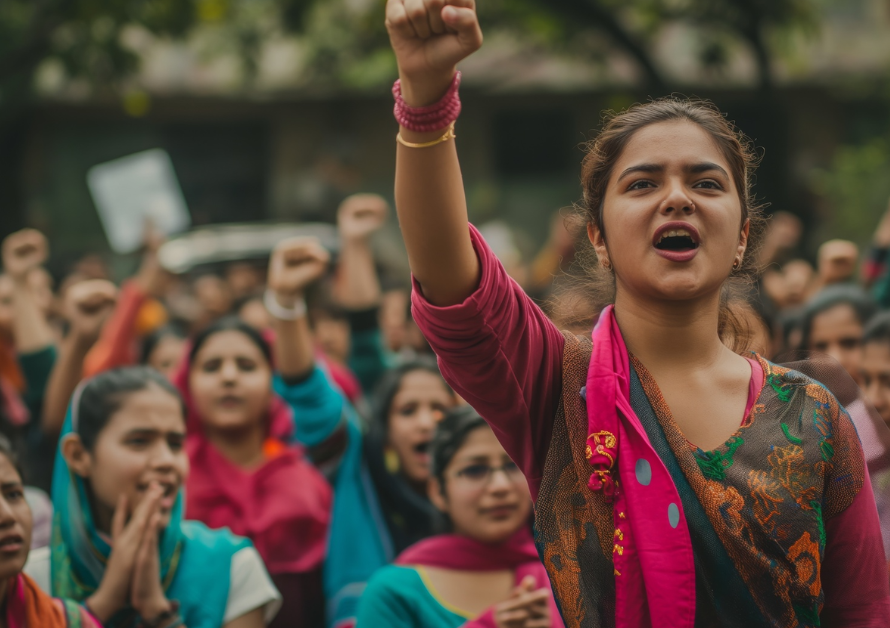Donald Trump’s victory in the U.S. presidential election is nothing short of a miracle. Just like in India, a narrative was created in America against Trump, suggesting that he would destroy the constitution, that if re-elected, there would never be another election, and that he would become a dictator. It was widely promoted that Trump’s defeat was certain and that Kamala Harris’s team would win. However, the results were surprising, as Trump clinched victory in almost all the swing states, shattering this narrative.
The Biden administration had plans to oust the Sheikh Hasina government in Bangladesh and, similarly, Indian opposition leaders, especially Rahul Gandhi’s group, were promoting the idea that within six months, India could also see a scenario similar to Bangladesh’s, where the Modi government could be overthrown. It was being claimed that just as people rose against Sheikh Hasina in Bangladesh, Indians would stand up against Modi. Rahul Gandhi was counting on American schemes to remove Modi, even meeting with prominent American officials in secret. Donald Lu, the Assistant Secretary of the U.S. Bureau of South and Central Asian Affairs, known for his expertise in destabilizing elected governments, had reportedly given Rahul Gandhi guidance on removing Modi from power.
Trump’s victory has now destroyed this narrative and has thwarted the plans of those hoping to unseat Modi in India. This outcome is a major setback for Rahul Gandhi and his Pakistani allies, as a critical pillar of their strategy has collapsed. There is now a possibility that details of Rahul Gandhi’s secret meetings with American officials may come to light, putting him in a difficult position.
Prime Minister Modi congratulated Trump wholeheartedly, indicating his happiness and the broader global impact this win could have. The key point is that Trump has stated he will halt all support to Ukraine, which will put Zelensky in a tough spot. India also hopes that leaders like Trump will take a firm stand against anti-India terrorist elements, such as Gurpatwant Singh Pannu. If Trump acts on this, Canada will also get the message to avoid supporting anti-India elements.
Indian journalist Narendra Joshi mentioned that whether Kamala Harris or Trump comes to power, it’s a win-win for India, as relations with both are relatively strong. However, I don’t fully agree with this view, as Democrats have not always treated India fairly. Under Biden, the supply of GE engines for Tejas aircraft was halted; a week before the election, 19 Indian defense companies were banned over transactions with Russia; pressure was put on India to stop importing Russian oil; and there was interference in India’s internal matters, including in issues related to Kejriwal. The conspiracy to destabilize India’s leadership during elections was evident, with American diplomats meeting opposition leaders unnecessarily.
The hope is that the trio of Modi, Trump, and Netanyahu (MTN) will succeed in establishing a new world order.
To build on this narrative and its concerns, here’s an approach with examples, case studies, and actionable next steps that may help reinforce the message and prompt engagement:
Examples and Case Studies
Bangladesh’s Political Influence:
Example: In recent years, the political upheaval in Bangladesh saw foreign influence attempting to destabilize Sheikh Hasina’s government. The United States, through certain diplomatic channels, was believed to be indirectly supporting regime change to bring in a more West-aligned leadership. This situation mirrors concerns about similar foreign interests impacting India’s political stability.
Case Study: The alleged role of U.S. diplomats in supporting movements against Sheikh Hasina showcases the methods foreign nations use to influence politics. This case can be used to emphasize how strong, sovereign leadership (like that of Modi and Hasina) is sometimes at odds with external interests that favor more pliable governments.
Canada’s Khalistan Movement Influence:
Example: Canada has often been criticized for housing a vocal Khalistani diaspora that openly advocates for a separate state. The support or at least the tolerance of these factions by Canadian authorities suggests a potential source of strain in India-Canada relations.
Case Study: Highlight how leaders in Canada have overlooked or tolerated Khalistani sentiment to appeal to their voter base, sometimes leading to incidents that directly affect India’s domestic security, such as the increasing Khalistani sentiments spreading among certain groups in Punjab.
Influence of International Arms and Pharma Lobbies:
Example: India’s increased defense self-reliance, particularly its indigenous arms industry, has irked international arms lobbies. These lobbies fear losing a large market as India reduces its dependency on foreign defense imports.
Case Study: A concrete example is the GE engine deal, where delays in supply might have occurred due to political leverage. Additionally, India’s strides in affordable generic drugs have been a point of tension with large pharmaceutical corporations, as seen with India’s pushback against Western pharma’s influence during COVID-19 vaccine rollout.
Attempts to Undermine Domestic Policies:
Example: India’s internal policies, such as Article 370 abrogation and the CAA/NRC, have met with international criticism and have been used as talking points by various foreign nations, suggesting interference in India’s domestic affairs.
Case Study: The international backlash India faced from left-leaning countries and organizations for the CAA and NRC could be illustrated here, showing how foreign governments and organizations sometimes take stances that indirectly affect India’s sovereignty.
Next Steps
Awareness Campaign on Foreign Influence:
Goal: Educate the public on how foreign governments and entities may be trying to influence Indian politics and policies.
Action: Conduct awareness sessions, webinars, aninformational campaigns on social media, explaining examples of foreign interference in both India and similar nations. Highlight stories like the above and emphasize the importance of independent decision-making for India.
Strengthening Internal Security Policies:
Goal: Fortify policies to reduce external influence on internal matters and strengthen sovereignty.
Action: Advocate for stronger policies that monitor foreign-funded organizations, media outlets, and non-profits operating in India, which may be susceptible to international influence. Encourage the government to streamline transparency in foreign-funded NGOs.
Building Alliances for Strategic Support:
Goal: Form strategic partnerships with countries that respect India’s autonomy and mutual interests.
Action: Support India’s alliances with like-minded nations (e.g., Israel, Japan, Southeast Asian nations) that value sovereignty. By strengthening such partnerships, India can leverage diplomatic support in global forums against undue foreign interference.
Public Mobilization for National Issues:
Goal: Foster unity within the population to stand firm on national interests regardless of external pressures.
Action: Encourage people to spread awareness on national issues that are being politicized internationally. Conduct information drives, distribute materials (both online and offline), and encourage citizens to discuss the importance of strong, independent leadership.
Voter Education Initiatives:
Goal: Promote informed voting by educating citizens on the impact of strong domestic policies versus foreign-influenced narratives.
Action: Organize forums, community meetings, and social media discussions aimed at explaining India’s progress in various sectors under current policies. Address the need to continue strengthening India’s autonomy and avoid falling prey to international influence.
Digital Transition to Secure Platforms:
Goal: Reduce reliance on platforms that may pose security risks or be susceptible to foreign influence.
Action: As discussed, transition group activities from WhatsApp to Telegram or other secure, indigenous platforms that offer better security and identity protection.
Summary
By sharing specific cases where foreign entities attempted to influence domestic politics and combining this with actionable steps, your group can generate more informed discussions and strengthen resolve around key issues.







